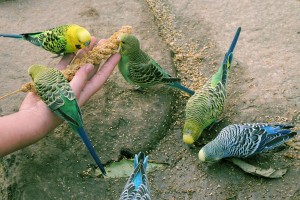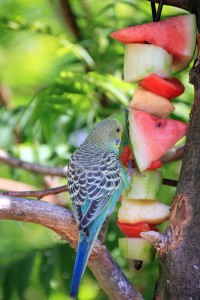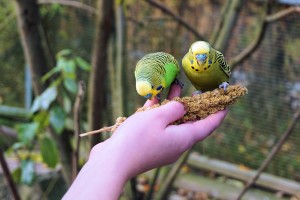The Healthiest Diet for Parakeets/Budgerigars
 Although budgerigars in their natural habitats of Australia eat mainly grass seeds, captive budgerigars feed on either dry, sprouted and/or soaked seeds. A diet of only dry seeds is inadequate for budgerigars and/or any parrot species’ optimum health. Avian veterinarians recommend pet birds’ diets be supplemented with foods such as:
Although budgerigars in their natural habitats of Australia eat mainly grass seeds, captive budgerigars feed on either dry, sprouted and/or soaked seeds. A diet of only dry seeds is inadequate for budgerigars and/or any parrot species’ optimum health. Avian veterinarians recommend pet birds’ diets be supplemented with foods such as:
Whole Cereals and whole Grains : Amaranth, Barley, Couscous, Flax, whole-grain Pastas, Oat, Quinoa (truly a Fruit but used as a Cereal), whole-Wheat, Wild-Rice, whole Rices.
Edible Blossoms and Flowers: Carnations, Chamomille, Chives, Dandelion, Day Lilies, Eucalyptus, Fruit tree’s blossoms, Herbs’ blossoms, Hibiscus, Honeysuckle, Impatiens, Lilac, Nasturiums, Pansies, Passion Flower (Passiflora), Roses, Sunflowers, Tulips, Violets. Note that the leaves of some of these plants are poisonous to budgies.
Greens and/or Weeds:
Mainly ; Bok-Choi, Broccoli and/or Cauliflower leaves, Cabbage leaves, Collard greens, Dandelion leaves, Kelp, Mustard leaves, Seaweeds, Spirulina, Water cress.
Occasionally and sporadically ; Amaranth leaves, Beet leaves, Carambola (Starfruit), Chards, Parsley, Spinach and Turnip leaves. All of these feature high Oxalic-Acid contents that induces production of Calcium Oxalates (crystals/stones) by binding Calcium and other trace Minerals present in foods and goods with which they’re ingested. Possibly, leading to Calcium deficiencies and/or Hypocalcemia in minor cases. Liver’s &/or other internal organs’ damage or failure in more severe cases.
Fruit (except Avocados which are toxic): all Apple varieties, Banana, all Berries varieties, all Citrus varieties, Grapes, Kiwi, Mango, Melons, Nectarine, Papaya, Peach, all Pear varieties, Plum, Star-fruit. Pits and seeds from every Citrus and Drupe species must always be discarded as they are intoxicating. However, achenes and tiny seeds from pseudo and true Berries (Bananas, Blueberries, Elderberries, Eggplants, Persimmons, Pomegranates, Raspberries, Strawberries, Tomatoes) are all okay.
Legumes: Almonds, Beans, Lentils, Peas, Nuts and Tofu.
Grain and/or Legume sprouts: Adzuki beans, Alfalfa beans, Buckwheat, Lentils, Mungo beans, Pinto beans, Red Kidney beans, Sesame seeds, Sunflower seeds. Caution with only Lima and Navy beans’ sprouts which are toxic.
Vegetables (except Uncooked Potatoes, Uncooked Onions and all Mushrooms): Beet, Broccoli, Cauliflower, Carrots, Cucumber, all Cabbage varieties, fresh Beans, fresh Romane Lettuce, fresh Peas, Parsnip, all Pepper varieties, all Squash varieties, Sweet potatoes, Tomato, Turnip, Yams, Zucchini.
Pellets specifically formulated for budgerigars, for Australian grass budgerigars and/or for small parrots are all healthy additions.
Other fat-free, healthy and nutritious human foods.
 Adding these foods provides additional nutrients and can prevent obesity and lipomas, as can substituting millet, which is relatively low in fat, for higher-fat seed mixes. Adult budgerigars often do not always adapt readily to dietary additions, so care must be taken to introduce healthy diets as young as possible (ideally weaned onto fresh foods before introducing chicks onto seeds). Parrots and budgerigars learn mainly by mimicry and thus most adult budgerigars will be easily encouraged to try new foods by observing another bird eating the food, or by placing the new food on a mirror.
Adding these foods provides additional nutrients and can prevent obesity and lipomas, as can substituting millet, which is relatively low in fat, for higher-fat seed mixes. Adult budgerigars often do not always adapt readily to dietary additions, so care must be taken to introduce healthy diets as young as possible (ideally weaned onto fresh foods before introducing chicks onto seeds). Parrots and budgerigars learn mainly by mimicry and thus most adult budgerigars will be easily encouraged to try new foods by observing another bird eating the food, or by placing the new food on a mirror.
Parrot species (including budgerigars) are herbivores. Consequently, they should be fed plant-based diets that are ideally supplemented with vegetable proteins, for example, produced by a combination of any type of whole grain with any type of legume. Eggs (hard-boiled and/or scrambled) are the only appropriately healthy source of animal protein, mostly for birds in either breeding, growing, moulting and/or recovering conditions. High levels of proteins (particularly animal proteins) are unhealthy for budgerigars and other Grass Parakeet species living under any alternate conditions (i.e. non-breeding, pets).
Alcohol, avocado, chocolate, caffeine, products containing lactose, garlic and onions present a danger of toxicosis and should not be fed.
Information from Wikipedia


